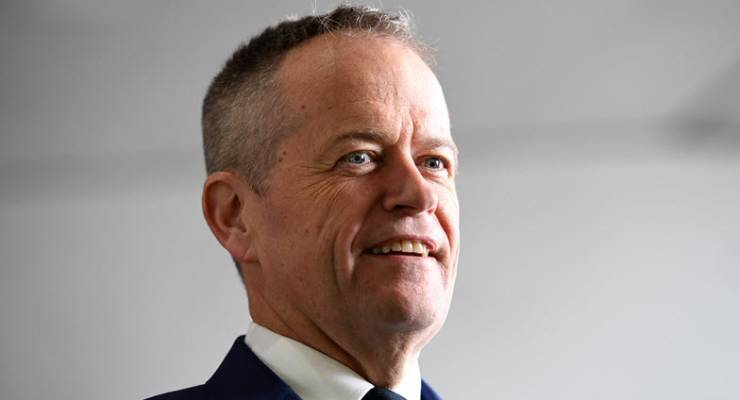
Give me lucky generals, not good ones.
variously, Napoleon, Eisenhower, Mazarin.
As the government lurched through another self-inflicted disaster this week, another rotten opinion poll, another bout of self-indulgence and navel-gazing, Bill Shorten was presenting a strong, coherent and unified party at Labor’s delayed national conference. The contrast was deeper than just appearances, however potent they were.
Malcolm Turnbull had caused a delay to the conference when he — in cahoots with Speaker Tony Smith — scheduled the mid-year byelections to coincide with it. The logic of this was always peculiar — Labor conferences rarely go off without at least some division as left and right go at it on asylum seekers and other totemic issues.
Turnbull’s replacement Scott Morrison then tried a variation of the same trick, announcing a new (new/same-old-same-old) governor-general the very moment Shorten was delivering his keynote address on Sunday. One of the reasons it was Morrison doing that, and not Shorten, is that the Liberals and the LNP had fared poorly in the July byelections, giving Turnbull’s enemies an excuse to push him out. Except, the Liberals hadn’t done that poorly; they’d just so badly managed expectations that anything less than victories in every seat and the ousting of Shorten by Anthony Albanese would have been a disappointment.
You can follow this chain endlessly back deep into the Turnbull government and its political tactics, but the consistent theme is, the Liberals could always be relied on to stuff up. Especially on those rare occasions when Shorten came under any sort of pressure. He has been one incredibly lucky general. At every electoral test this year, his opponents — whether the shambolic Greens in Batman or in the July byelections — have devised ways to stuff up.
Whether that luck holds until polling day next year remains to be seen. Lots of people are writing the Liberals off, and it’s hard to avoid joining them, but momentum could shift in the new year. But, crucially, Shorten’s luck has been earned. On the economy, and taxation, there’s been no small target strategy. Quite the opposite — in effect Shorten has invited the Coalition and News Corp to have their best shot at Labor’s policies on negative gearing and capital gains tax and ending the dividend tax credit rort by selfish wealth retirees. And Shorten has used the shift in electoral sentiment against neoliberalism and the rising concern about inequality and corporate power to craft a coherent economic narrative, which stands in particular contrast to the lack of any narrative at all from the Coalition. Long gone are the days when Labor — and Shorten — were accused of standing for nothing. Now, according to their opponents, they stand for too much.
No one’s luck lasts forever, whether earned or not. Even so, in a year in which the political class has failed to address the disaffection and contempt so many voters have for our political system, Bill Shorten has been far and away the most effective politician.
Honourable mentions
The crossbench: The only “party” to expand its parliamentary representation during the year, the independents in the House of Reps ended 2018 by terrifying the government into shutting parliament. They now promise to make parliamentary life as embarrassing as possible for the Coalition in the thirteen minutes of sittings planned by the government before the election. Special acknowledgement to Andrew Wilkie who with Rex Patrick, Tim Storer and Nick McKim, were the only politicians to have the guts to speak up about the government’s vexatious prosecution of Witness K and Bernard Collaery and the Liberal-Labor cover-up of ASIS’ crimes.
Craig Laundy: This is the spot normally reserved for Mathias Cormann, who not so much blotted his copybook this year as chucked it into a vat of ink with his role in the leadership debacle and the “it’s OK to be white” catastrophe, but still managed to keep spending in check and assure his status as an outstanding finance minister, no matter what happens in the election. Instead, Craig Laundy gave a demonstration of how to put loyalty and stability ahead of political self-interest. Only two people accompanied Malcolm Turnbull into his final party room meeting on August 24 — a very ill Arthur Sinodinos, and Laundy. Laundy was a minister with a big future ahead of him, but stuck by his leader to the end and expressed his disgust at the circus his party had created. The Liberals need a lot more Laundys if they’re to regain credibility. So does politics in general, for that matter.








Crikey is committed to hosting lively discussions. Help us keep the conversation useful, interesting and welcoming. We aim to publish comments quickly in the interest of promoting robust conversation, but we’re a small team and we deploy filters to protect against legal risk. Occasionally your comment may be held up while we review, but we’re working as fast as we can to keep the conversation rolling.
The Crikey comment section is members-only content. Please subscribe to leave a comment.
The Crikey comment section is members-only content. Please login to leave a comment.